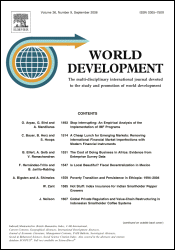
Redefining the social contract in the wake of the Arab Spring: the experiences of Egypt, Morocco and Tunisia
El-Haddad, AmirahExternal Publications (2020)
in: World Development 127, article 104774
The social contract is the deal between the state and its citizens by which the latter agree the rule of the former in return for deliverables. Over time, the state’s deliverables have evolved from simple law and order to a set of social rights, such as the social contract in North African countries like Egypt, Morocco and Tunisia –in the 1950s and 1960s. State-led development, including state-led industrial development, provided jobs to many, with state provision of health and education and a range of consumer subsidies. Deteriorating economic performance led to the collapse of this model as the state could no longer provide these deliverables. Instead, an ‘unsocial’ social contract emerged under liberalisation in which the state used trade, industrial and other economic policies to favour an emerging group of crony capitalists who in turn provided support for the regime. The growing inequality and diminishing benefits for the masses undermined its sustainability resulting in the Arab Spring. The trajectory of the social contract has differed in the three countries. In Egypt, the ‘unsocial’ social contract is further entrenched. The army is taking the role of a leading business-group using industrial policy to political ends. Its strong engagement in the economy makes it an interested party rather than an impartial arbiter. In Morocco, the King still retains a prime position but has accommodated some pressures for a more inclusive industrial policy in domestic markets, which may lay the basis for a more broadly based social contract. Tunisia is finding its way to an even more inclusive development model, but is still struggling for consensus for a clear economic policy direction and remains threatened by extremist elements. International efforts to support democratic development in these countries need to be conditioned on the differing nature of the ongoing transitions in the social contract.

